Disciple: When We Planted, We Prayed
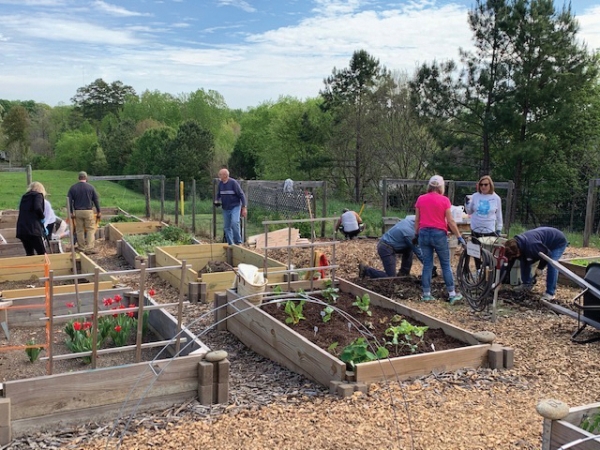
Community gardens feed hungry neighbors and restore creation
By Summerlee Walter
There is nothing quite like the taste of a tomato straight from the garden, juicy and still warm from the sun, tinged with the sharp, green smell of the vine. At churches across the Diocese, gardeners have transformed portions of the campuses into community gardens full of tomatoes, squash, peppers and beans. Many donate portions of their harvest to local meal programs or pantries, and others plant their gardens to honor creation and steward the land.
The congregation of Church of the Nativity, Raleigh, has been stewarding their patch of land since 2011. The church now hosts 12 4-by-8-foot raised beds between its parking lot and the education building. The gardeners not only farm vegetables and herbs, however; they also farm carbon. Through a process known as carbon farming, compost applied to the beds increases plant growth, helping crops remove more carbon dioxide from the air and store—or sequester—it in the soil. The benefits of carbon farming are threefold: composting reduces the amount of food waste that ends up in landfills, nutrient-dense compost increases crop yields, and carbon sequestration helps to reduce an individual’s or organization’s carbon footprint.
[Image: The SEEDS garden at St. Alban’s, Davidson, produces vegetables and fellowship. Photo courtesy of Ginger Knudson]
The community garden at Nativity does not benefit only the environment, however; produce grown in its beds also supports neighbors experiencing food insecurity. Gardeners donate at least 50% of their produce—and sometimes more, especially during peak summer harvests. (Yellow squash, anyone?) The church has committed to “plant a row for the hungry” through the Inter-Faith Food Shuttle program, and they give produce directly to their neighbors at the Windsor Springs Retirement home, a low-income facility.
“Our spiritual ancestors tell us the story of our creation through scripture: we were created by God in the dirt—the earth creature—and then given life by God breathing God’s spirit upon us,” the Rev. Stephanie Allen, rector of Nativity, said. “I can’t think of a better place than church to be reminded of our humble beginnings, our vital connection to the earth and the gift of life through God’s spirit. Whether you garden at home or at church, digging in the dirt, producing food that God has given us, and then sharing that nourishment with others is an act of adoration, worship and prayer. We need gardens at church to both remind us of this truth and to practice that adoration within a community rooted in Christ’s love.”
The Church of the Advocate, Chapel Hill, also donates much of the produce from their community garden to their neighbors. Like everything at the Advocate, the garden grew from humble beginnings and community gifts and expanded into what it is today. Starting out as a small, makeshift plot located where the current parking lot lies, the Advocate moved the garden to its current location in front of the church sometime around 2011.
“The first garden beds for that garden were created, lasagna style, on a church-wide spring work day, with people contributing newspaper, kitchen scraps, grass clippings and old leaves,” Martha Wheeler, the Advocate parishioner who heads up the community garden, said. “I was amazed that vegetables grew in those beds the first year!”
In 2017, the church used a gift it received to double the size of the garden and install a high-quality deer fence around the perimeter. The man who built the fence was so delighted to be working on a church garden that he gifted the Advocate a beautiful gate. The current garden measures 20 feet by 30 feet with 11 beds of varying sizes. The church doesn’t assign gardeners to individual beds; instead, everyone works together to tend the plots.
Before COVID-19, when the Advocate hosted community lunches after celebrating the Eucharist, some of the produce from the garden was served at their shared table, especially in the taco bar, where tomatoes and lettuce were popular toppings. Along with weekly non-perishable food collection, parishioners also take produce from the garden to the Community Market food pantry at the Inter-Faith Council for Social Services in Carrboro, and they share produce with residents of the Pee Wee Homes on the Advocate’s campus.
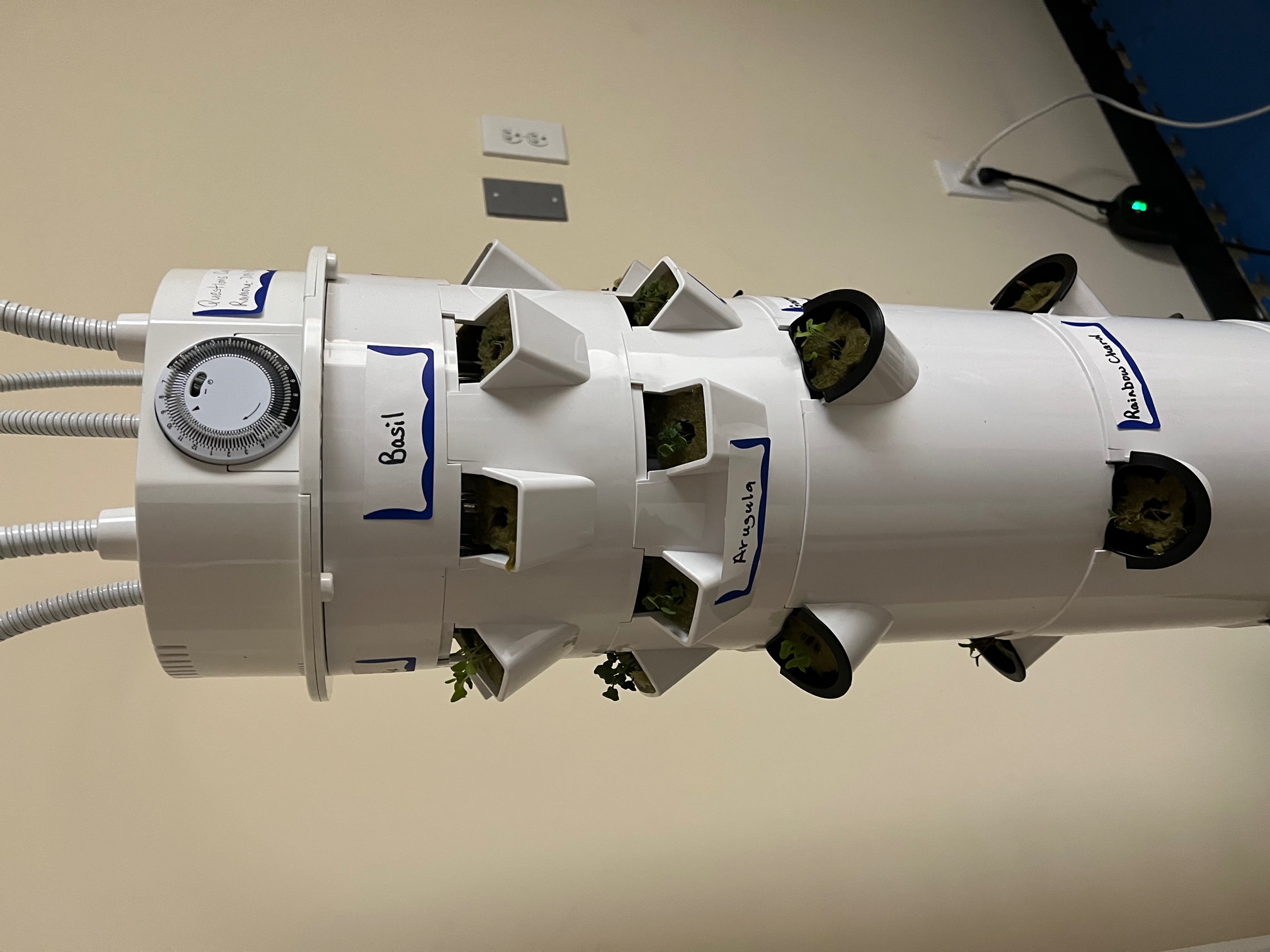
“At the Galilee Center we provide a sacred place of welcome and belonging,” Faith Hamilton, interim executive director, said. “The Tower Garden provides an ecologically centered welcome experience with our partners and new friendships so that we can care for our earth together as one. What we gain from this project will be, in every way, a sacred harvest.”
[Image: One of the new hydroponic tower gardens at Galilee Ministries of East Charlotte will soon yield basil, arugula and rainbow chard. Photo courtesy of Galilee Ministries]
There is also a social component—the “community” in community garden. At St. Alban’s, Davidson, both parishioners and community members from as far away as Concord and Huntersville rent space in the 52 4-by-8-foot raised beds that compose the SEEDS Community Garden. While the church supplies water, hoses, large garden tools and bed maintenance, each gardener agrees to attend two work days annually, coming together to weed common areas and maintain the fence before focusing on their own beds. They also participate in semiannual Holy Happy Hours, during which everyone gathers for a potluck and beverages after the priest blesses the garden beds. The littlest members of St. Alban’s are included, too, as they learn about creation care and food systems by caring for the the two beds belonging to St. Alban’s Weekday Preschool. Fast-growing beans are a perennial favorite, and last fall yielded a bumper crop of pumpkins.
The garden has drawn people deeper into relationship with St. Alban’s. The church’s newly completed prayer trail with Stations of the Cross is highly visible, beginning just outside the garden fence, and two couples who first connected with the church through the garden have started to attend Sunday worship.
“The garden provides a lot of social interaction,” Ginger Knudson, who chairs the SEEDS board, said. “There’s such a broad outreach, so many different people who you might not meet normally who you will meet in a garden.”
Even if your church does not have the space, volunteers or sunlight to sustain a community garden, parishioners still have the opportunity to support creation care and food stability ministries through The Episcopal Church’s Good News Gardens movement. The idea is simple and infinitely scalable: plant extra produce in your garden, whether it’s a window box, a raised bed or a farm, and donate the excess harvest; pray for the Church and its creation care ministries; and proclaim the love of God by sharing your Good News Garden story.
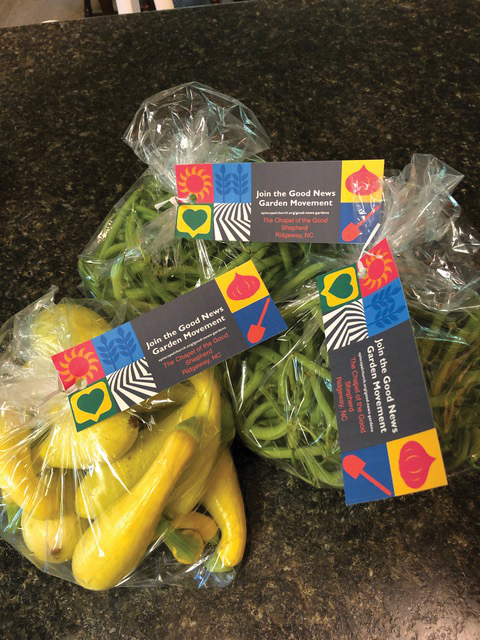
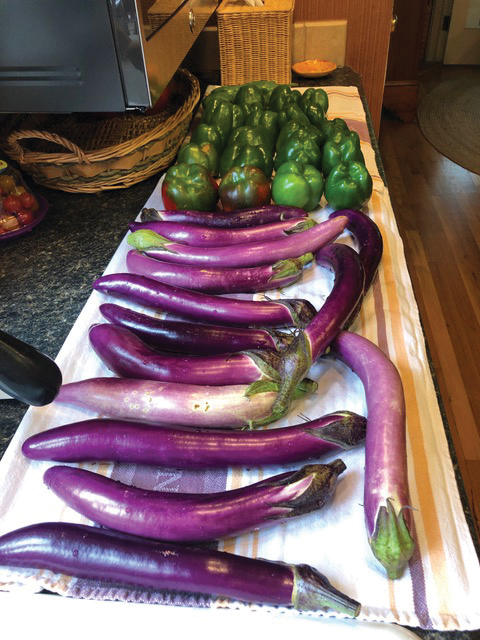
For Nancy and Don Johnson of Good Shepherd, Ridgeway, that looks like donating extra squash, tomatoes, cucumbers, peppers, eggplant, green beans and okra from their extensive garden to their neighbors. Nancy bags excess produce with personalized Good Shepherd tags downloaded from the Good News Garden section of the Episcopal Church website and distributes them directly to people who she thinks can use the extra vegetables. (Their local food pantry does not accept donations of fresh produce, though many organizations that distribute food do.)
“When we planted, we prayed,” she said. “When you go out and work in the garden, it just makes you feel close to God. You know there’s something bigger than you out there.”
[Image: Nancy and Don Johnson donate produce from their garden to local families who need food support as part of the Good News Garden program through The Episcopal Church. Photos by Nancy Johnson]
Nancy also participates in monthly webinars through the Good News Gardens initiative, which provides continuing education and the chance to troubleshoot gardening woes with other gardeners.
No matter how your garden grows, each church and individual has the opportunity to care for our neighbors and all of creation through the acts of sowing, tending and harvesting.
“I think having a garden is good land stewardship. Gardens are beneficial for the soil and for the air,” Wheeler said. “They nourish and shelter pollinators and other creatures. And they are beautiful. Working in a garden is a reminder of God’s joy in creation—as well as God’s tender care for us, collectively and individually.”
“I think the ability to come to a beautiful place and plant a garden is very soothing for people,” Knudson reflected. “I think it soothes their spirit. It’s hard to leave the garden frustrated if that’s the way you arrived. It’s just relaxing.”
LEARN MORE
If you’re interested in starting your own Good News Garden, either at your church or your home, find resources from The Episcopal Church at episcopalchurch.org/good-news-gardens/.
Summerlee Walter is the communications coordinator for the Diocese of North Carolina.
Tags: North Carolina Disciple / Creation Care
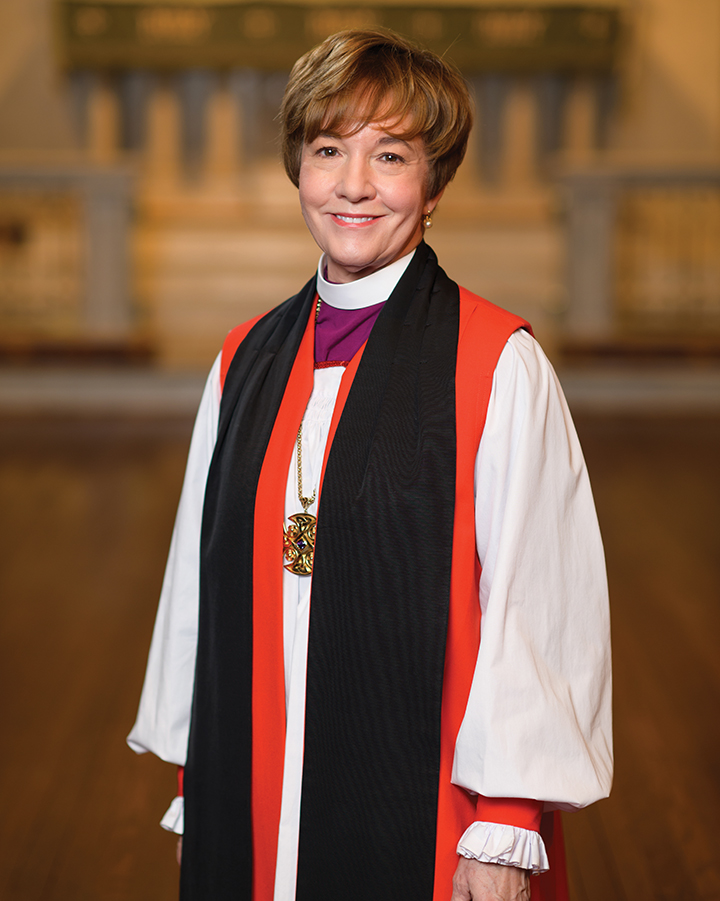 Assistant Bishop
Assistant Bishop
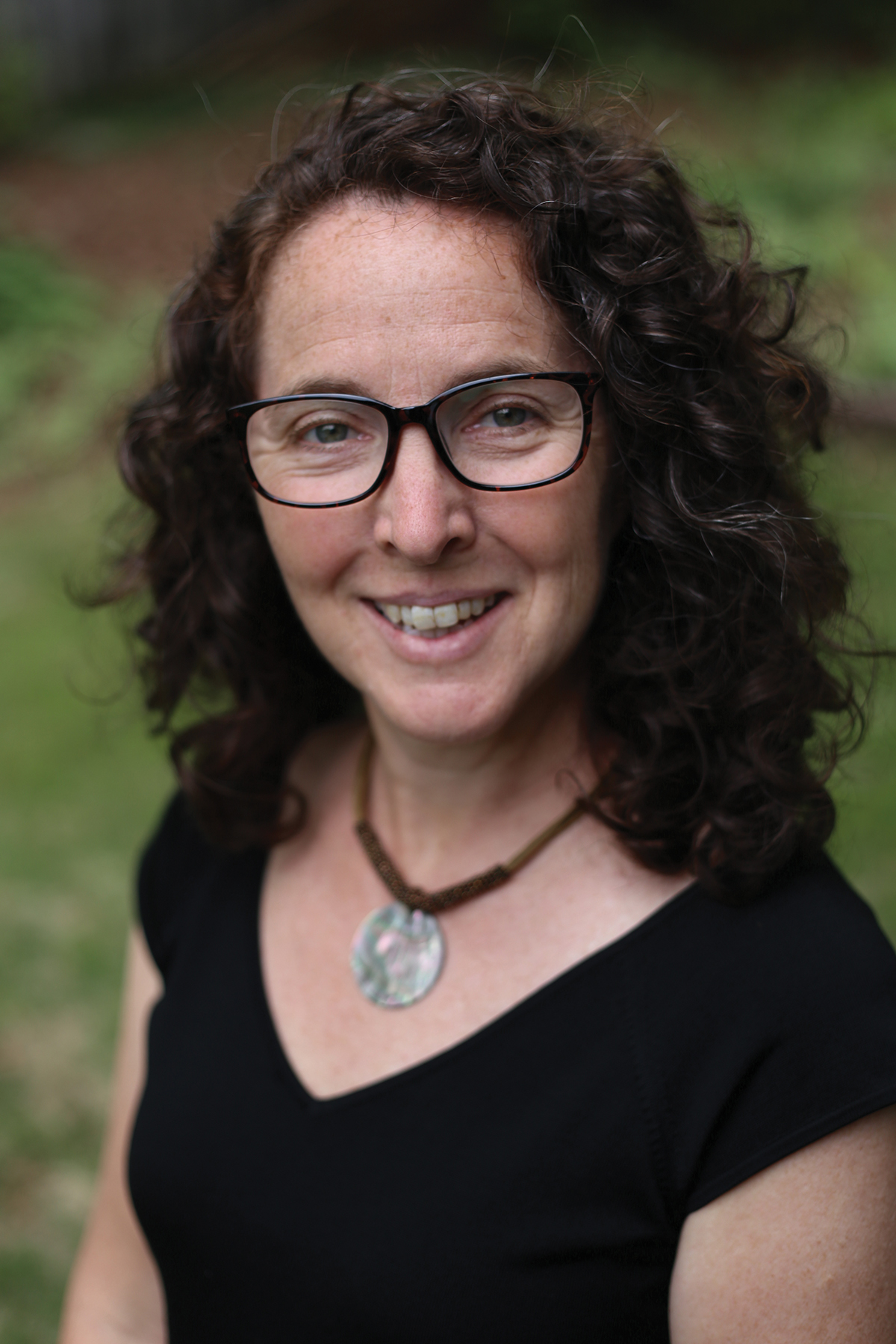 Mission Strategy Coordinator
Mission Strategy Coordinator
